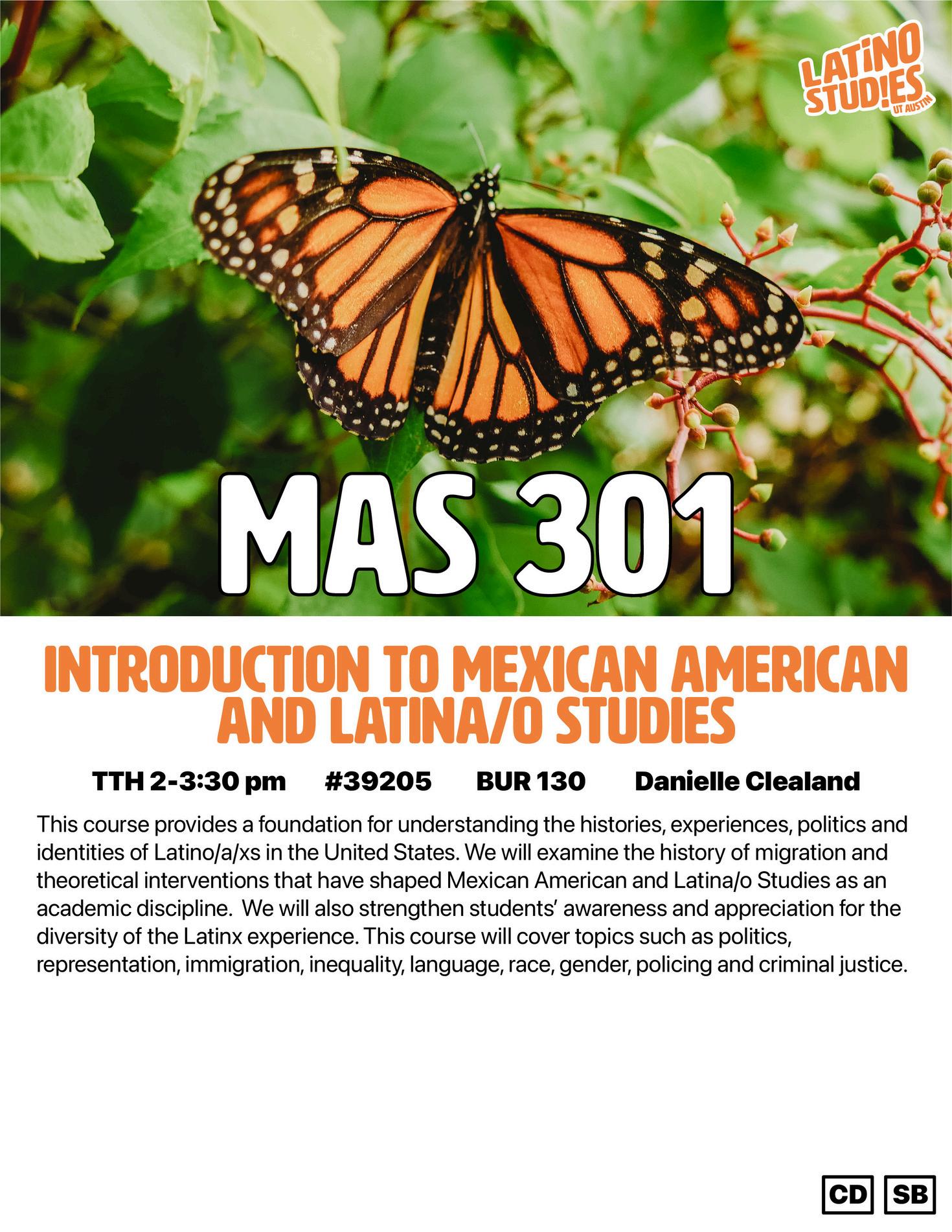

mals courses fall 2025
mas 301
Intro to mexican American & latina/o studies
An introduction to the theoretical and substantive issues covered under the interdisciplinary rubric of ethnic studies. Explores the Mexican American and Latina/o experience through the methodological approaches of historical analysis, cultural critique, and social production.












An introduction to the theoretical and substantive issues covered under the interdisciplinary rubric of ethnic studies. Explores the Mexican American and Latina/o experience through the methodological approaches of historical analysis, cultural critique, and social production.






Ethnicity & gender: La chicana
9:30am-11am

The 1971 La Conferencia de Mujeres por la Raza in Houston, among many other catalysts, inspired how Chicanas/Xicanas, Xicanindias, Afroxicanas, mestizas, Indigenous, Mexican American, and brown women along the Borderlands defined themselves, asserted their roles and identities, and shared their stories. This course privileges the stories, struggles, contestations, imaginations, writings, and accomplishments of Chicanas in the US in the mid-twentieth and early twentieth-first centuries. Through a close examination of literature, and attention to historical and theoretical materials, we will create a growing understanding of the significance of gender, sexuality, race, ethnicity, class, language, spirituality, and citizenship in affecting the daily lives and social worlds of Chicanas. By end of the semester, we will also gain a complex insight into the importance of how Chicana feminism, Xicanisma, intersectionality, migration, borders, and community are formative in the Chicana experience(s).




Black and Latinx Intersections mas 318f
MW 9:30am- 11am #41690 JES A303A Wanda Hernández
Scholars, journalists, and pundits have argued that the new status of Latinxs as the “majority minority” population in the U.S. would diminish the political and economic power of the Black community and exacerbate simmering tensions between Black and Latinx groups. In this course, we will think through Blackness and Latinidad in two ways. First, we will challenge the notion that Blackness & Latinidad are mutually exclusive through Afro-Latinx subjectivities. Additionally, we will focus on what interactions between Black American & Latinx groups illuminate about race and power relations in the U.S., and in regionally specific locations. While this course asks what real and perceived moments of tension tell us about structures of inequality experienced by both groups, the readings in the course move beyond the dominant conflict paradigm to look at the complex relationship between Black American & Latinx communities.





Fighting for Latino Power mas 318p
TTH 3:30pm-5pm #41696
GEA 114 Angie Gutierrez
In this course, students will learn about issues that affect Latino political representation in the U.S. today. This course will be divided into three aspects that are critical to U.S. political power. Starting with the U.S. Census, we will discuss the political implications of being counted. Why does the census matter, and what does it mean for Latino communities? We will explore ethnic and racial classification on the census and how this impacts how minorities are represented in the U.S. We will then transition to voting rights and learn about the rights Latino voters have and how these voting rights have been protected through the courts. We will discuss past voting rights cases in addition to present and future threats to Latino voting rights. Finally, we will conclude by examining Latino political representation in elected offices through both campaign outreach and descriptive representation.



mas 319
North american borderlands
TTH 12:30pm-2pm #41700 GWB 1.130 CJ Alvarez
This course examines the formation of political borders in nineteenth- and twentieth-century North America, their contestation, and the multiple meanings attached to them. Discussion topics include borderlands historiography, the physical demarcation of boundary lines, borderlands identity formation, economic land-use, the nonhuman world, and policing and empire.



Tejana Cultural Studies
TTH 12:30pm-2pm #41720 BIO 301 Lilia Rosas
With the publication of Entre Guadalupe y Malinche, editors Inés Hernández-Ávila and Norma Elia Cantú solidify their mandate to legitimize Tejan@/x Studies as an arena worthy of ongoing research, study, and comprehension. Furthermore, they center the narratives of Tejanas as a necessary part of the conversation to understand this emergent field of inquiry and integral to Chicana Studies. In this course, we investigate the history of Tejanas to reaffirm and reclaim their place and role in the histories of Native Americans, woman, Chican@/xs, Greater Mexico, and the United States. We will further explore how transfrontera and transregionalism complicate this history. Last, we will contemplate how their stories are fundamental to illuminating the struggles, resistance, and liberation from precontact to decolonization.





latinx legend tripping
MWF 10am-11am #41725 CMA 3.114 Rachel González-Martin
Legend tripping is the process by which individuals and groups visit and/or recreate legendary contexts, with the hopes of facilitating an encounter with the strange. This course will focus on narrative folklore and practice from diverse traditions across the U.S. based Latinx diaspora. Legends, or folk narratives told as true share interpretations of the strange in everyday social life of tellers and audiences alike. Shared amongst peers and across generations, legends within Latinx communities have been used to influence the behaviors and beliefs of young women. Through reading, collecting, and analyzing legend texts such as La Llorona, Dancing with the Devil, La Lechuza among other stories of supernatural encounters as well as interrogating key figures, such as brujas, curanderas, hechiceras, students will engage with these texts the instrumentalization of a community logic of supernatural belief that impact the development of gender and sexuality identities across US Latinx communities.




pOLICING LATINIDAD mas 364e
TTH 3:30pm-5pm #41735 GEA 127
Mike Hames-García
How does the criminal justice system make itself felt in the everyday lives of Latinxs? From border enforcement, to stop and frisk, to the phenomenon of mass incarceration, many Latinxs find themselves and their communities enmeshed within a dense web of surveillance, punishment, and detention. This interdisciplinary course will examine the historical, political, economic, and social factors that have, in many ways, criminalized Latinidad and/or rendered Latinidad illegal. We will examine how race, class, education, gender, sexuality, and citizenship shape the American legal system and impact how Latinxs navigate that system. This course will pay special attention to the troubled and unequal relationship between Latinxs and the criminal justice apparatus in the United States and how it has resulted in the formation of resistant political identities and activist practices.





MWF 9am-10am #41745
This course explores concepts of membership, belonging, immigration & citizenship in the Latina/o/x experience through examination of historical, political, social, & cultural factors. Our interdisciplinary investigation of these topics draws from materials & knowledge in political science, sociology, history, public policy, & the law. The course surveys materials, concepts, & theories to investigate how race, immigration, gender, geography, politics & policy have defined how, when & under what circumstances Latinas/os/xs belong or do not belong in America. We will pay particular attention to understanding the contours of citizenship, membership, American identity, & the political impact of inclusion or exclusion specifically as it pertains to present-day debates about Latinx political engagement, political attitudes, & immigration politics. We will explore theoretical & policy debates on the topics of immigration & citizenship, & we will evaluate the research that informs these debates.




US Immigration Policy & Stories of MIgration
TTH 11am-12:30pm #41760 GEA 114 Angie Gutierrez
The story of racial & ethnic politics in the United States is one of struggle, resistance, & change. While many sought to migrate to the U.S., its doors have not always been open to everyone. Who can enter the U.S. & become American? This political & social question has had different answers throughout history. In this course, we’ll cover the role of immigration policy in defining the face of American politics & society. What are the ethical implications of U.S. immigration law? Can immigration law be written ethically? We’ll discuss how enacted U.S. policies have impacted migration into this country and their impact on defining who can become American. We’ll combine the history of immigration policy with memoirs of migration, immigration policy, & incorporation, providing a fuller picture of how immigrants affected by these policies are treated in the U.S. We’ll also discuss the ethics of migration & the reasoning behind why people choose to immigrate, both with & without documentation.




mas 374 Diasporic Identities
MW 12:30pm-2pm #41769
ETC 2.114 Nicole Ramsey
This course examines how race, gender, and migration shape diasporic identities in ways that extend beyond national borders but remain deeply entangled with U.S. racial formations. We explore how movement—both forced and chosen—creates diasporic communities that carry histories of colonialism, resilience, and reinvention. Through a hemispheric lens, we trace how ideas of Blackness, Indigeneity, and belonging shift across the Americas, revealing the ways racial meaning is both fluid and insistently recognized. Using personal narratives, cultural texts, and political histories, we consider how diasporic subjects define themselves, make claims to space, and challenge the boundaries of identity.
Photo: Courtesy Tony Gleaton archive





mas 374 Latinx queer Historias
TTH 2pm-3:30pm #41775 BIO 301 Lilia Rosas Photo
Through this course, we will examine the persistence, narratives, uprisings, and achievements of Latin@/x 2SLGBTQ+ peoples in Turtle Island, Greater Mexico, and the U.S. We will specifically study the lives and stories of Indigenous and Latin@/xs queer folk from the late nineteenth and twenty-first centuries, using a multidisciplinary historical and intersectional perspective to comprehend the social, cultural, political, and economic factors, which have informed these experiences. Last, we will reflect upon how of Latinx 2SLGBTQ+ peoples have identified themselves, rebelled against repression(s), and shaped their own freedom and emancipation from their perspectives as brown, Indigenous, Afrolatin/@x, (me)Xican@/x/Latinx peoples.





mas 374 Native Borderlands
TTH 11am-12:30pm
If you have ever wanted to know more about the historical context of the first peoples in what is today in the United States, this class will help you understand that. If, on the other hand, you have received only passing glimpses of Native America filtered through distortions in popular culture and have not thought very far beyond that, then this class might open fascinating new points of view and ways of looking at the world and people around you. Discussion topics include terminology, archaeology, colonialism, Native intellectual history, and the future.



mas 392
Abolition/the carceral state
W 1pm-4pm #41810 GWB 1.138 Mike Hames-García
This topic approaches abolition as a set of open-ended questions to be asked generously in response to the conditions of a radically unjust and unfree world. Abolitionist visions advocate for decarceration, defunding of police and prisons, and removal of the criminal legal system from people’s lives. Abolitionism is also a creative practice that entails discovering, developing, and promoting alternatives to policing and prisons such as mutual aid associations, restorative justice processes, and nonviolent approaches to personal and community safety. Drawing from many disciplines—including American, ethnic, and gender studies, geography, history, law, philosophy, and theology—this course takes up topics like border and immigration enforcement, electronic surveillance, local policing agencies, and medical confinement.
mas 392



Latina/o/x Politics
M 2pm-5pm #41815 BEN 1.108 Angela X.
Ocampo
This course explores the key research questions, major paradigms, and lines of inquiry in the study of Latina/o/x politics in the United States. This course starts with an overview of the foundation of Latina/o/x politics as an area of inquiry and how Latinas/os/xs emerged as a key political group. We will explore classic and more recent debates surrounding the emergence of Latinxs as a cohesive group and interrogate the concept of Latinidad. The course will also investigate major themes in Latinx politics including panethnic identity, national origin identities, social movements, political behavior, mobilization, partisanship, public opinion, religion, transnationalism, representation, and gender in the study of Latinx politics. Lastly, we will consider future directions of the subfield.
mas 392
Queer Latinx Aesthetics
T 3:30pm-6:30pm

#41820 GWB 1.138
Laura Gutiérrez
The seminar introduces students to different art forms in the US Latinx context post-1968 as we explore their critical potential. We'll also track the ways in which artistic production by queers of color have been taken up in critical theory and art criticism to advance ideas in visual cultural studies. In our discussions we will thread the three concepts in the course title to explore contemporary queer and trans Latinx artistic production and its relationship to ideology and power, while we question how its inclusion and/or exclusion in/from Latinx studies, queer studies, and (performance) art history. The heart of the seminar will be the weekly discussions of the material, with weekly short writing assignments, one presentation on an art object or performance, and a final research paper. Additionally, we will be engaging with art either directly via documentation in the classroom or through excursions to collections, exhibits, and/or performances.

mas 395m
Interpretive Methods
TH 2pm-5pm #41825 GWB 1.130
Julie Minich
This course offers graduate students the opportunity to explore and examine different methodological approaches employed by Latinx Studies scholars across disciplines, with an emphasis on modes of inquiry in the humanities and qualitative social sciences. Readings prioritize recent publications by Latinx Studies scholars (especially those from within this department) that showcase exemplary methods within a specific discipline, demonstrate methodological innovation or invention, and/or model interdisciplinary methods; students will also have the opportunity for short methodological conversations with selected scholars. In addition to exploring traditional disciplinary formations (history, anthropology, literary criticism, etc.), we will also examine interdisciplines like queer studies, disability studies, feminist studies, the environmental humanities, and/or the health humanities.
